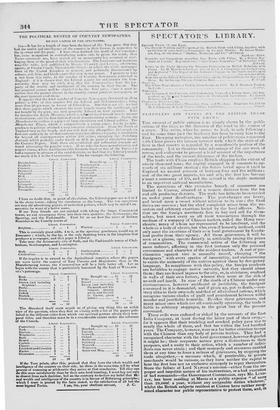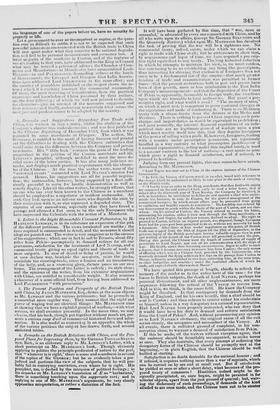PAMPHLETS AND PAPERS ON THE BRITISH TRADE
t11 C It I N Tll E current of public opinion is as eicarly shown by the pnblicatiens of the tinie, as the direction of tin:. wind by the COUrse of
a straw. The critic, when be seems to lead, is only flillowing; and Ihr some time past the tendency has been to carry him to the East. Dropping metaphor, the number nf peblications connected
With China proves the intense interest with which the state of affhirs in that country is regarded by a considerable portion of the community. Let us therefore take advantage of the one week of recess, and endeavour to present a brief account of the itnportance of the trade, and the present diletnmas of tbe traders.
The trade with China employs British shipping to the extent or ninety thousand tons; the capital engaged in it amounts to upwards of six millions sterlieg ; the ditties levied upou it yield to England an annual revenue of between four and five millions; and of the two great imports, tea and silL, the first has become temost it necessary of lire, and the second is the staple material in an important national manufacture.
The operations of this extensive branch of commerce are limited to Canton, situated at a remote distance from the tea and silk producingdistricts. The trade has hitherto been carried on under great disadvantages. The port-charges are heavy, and levied upon a vessel without relation to its size ; the fixed duties are onerous ; but the chief complaint arises from the uncertain and arbitrary exactions levied by the local officers. Neither are the foreign merchants free to buy and sell for themselves, but must carry on all their transactions through the medium of a company of Chiaese traders, called the Hong merchants;. many of whom are represented to be insolvent, and the whole as a body of cheats, but who, even if honestly inclined, could only meet the exactions of their own local government by fraudulent profits from their agency. All these grievances, it will be seen at a glance, operate directly in artificially raising the prices of commodities. The commercial action of the following are more indirect, affecting in the first instance only the personal convenience and character of the resident traders. A sort of proclamation against vice is annually issued, charging " the foreigners" with every species of immorality, and endeavouring to excite the animosity of the natives against them by derogatory language. In compliance with this policy, the foreign residents are forbidden to engage native servants, lest they should abuse them ; they are denied ingress to the city, or, in strictness, confined to walls of their own factory, whence they issue at the risk of assault anti insult. In case of the death of a Chinese under any circumstances, however accidental or justifiable, the foreigner concerned in it is demanded, and if given up, put to death.—contrary alike to their own mule and that of all civilized nations, which recognize various'shades of guilt and punishment between wilful murder and justifiable homicide. Besides these grievances, and many minor ones which are all continually operating, the trade Is liable to arbitrary stoppages, to the great loss of the persons concerned.
These evils were endured or risked by the servants of the East India Company, at least during the latter part of their sway.— for it appears that their truckling and crooked policy gave rise to nearly the whole of them, and that too within the last hundred years. The Company, however, were in a far better situation to cope with the Chinese than any body of private traders. They haul a recognized character with the local government, however degraded it might be; their corporate nature gave a distinctness to their purposes, and a unity to their action, which a number of individuals can never attain ; and their monopoly and resources enabled them at any time to force a redress of grievances, by stopping the trade altogether,— a measure which,. if practicable, to private merchants would be ruinous, as they have neither the capital to bear the first loss nor an exclusive monopoly to repay themselves. Since the failure of Lord NAPIER'S mission—either from the proper and impolitic nature of his instructions, or a bad execution of bad commands—the Government Commission, says Mr. LINDSAY, has been residing at Macao at a public expense "of more than 20,000/, a year, without any assignable duties whatever,' whilst the British subjects resident at Canton have neither recor
nized character nor public representative to protect them, and, m
the language of one of the papers before us, have no security for property or life. Let a government be ever so incompetent or supine, or the question ever so difficult to settle, it is not to be expected that such powerful interests as are conneeted with the British trade to China will rest quiet under what they conceive to be national degradation and feel to be personal incouyenience and pecuniary loss. A large majority of the residents in Canton. and of the captains of ves-els ti ailing to that port, have addressed to the King in Council what may be termed a petition of advice; the Chamber of Commerce and Manufaetures at Alanchester have memorialized Lords ATELHOU:;NE and PssstneseoN, demanding redress at the hands of Government; the Liverpool and Glasguw East India Associations have addressed Lord Mesnomixe to the same effect ; and the number of pamphlets published on the subject shows the interest which it is exciting amongst the commercial community. Of these, the most deserving of consideration, from the practical experienee and knowledge of China possessed by their authors, are the four Iblheving ; of which we will now proceed to describe the character—give an account of the measures suggested and their reasons—and finally, endeavour to ascertain what seems the most jut and prudent course to be adopted by the country.



























 Previous page
Previous page